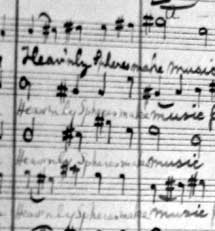
4. Planetary Fame
In the Summer of 1911, under the guidance of Gustav Holst, Morley College gave the first performance of Henry Purcell's, The Fairy Queen since the seventeenth century. The full score had been lost since after shortly after Purcell's death. Holst got permission for several of the Morley students to copy out the complete vocal and orchestral parts. It was a colossal task. There were 500 pages of manuscript and it took those inexperienced copyists nearly a year to write them out in their spare time. For Holst, the performance was probably the most exciting thing he had yet done.
The first performance of The Cloud Messenger came in 1912. It was not a success. The failure of the performance which he conducted depressed him and he went to Spain for a holiday Balfour Gardiner and Clifford and Arnold Bax. While there, Clifford Bax encouraged his growing interest in Astrology and long after the success of The Planets, Holst would cast horoscopes for his friends. "My pet vice!", as he would call it.
 In 1913, the new music wing of St. Paul's was opened and he was given the large sound proof room for his work. On weekdays he would teach in it, but on Sundays and holidays he spent hours composing there. The first piece he wrote there was St. Paul's Suite.
In 1913, the new music wing of St. Paul's was opened and he was given the large sound proof room for his work. On weekdays he would teach in it, but on Sundays and holidays he spent hours composing there. The first piece he wrote there was St. Paul's Suite.
It was about this time that Holst became wildly excited over the rediscovery of English madrigal composers. Weelkes was his favorite of all the Tudor composers but he also adored Byrd and Purcell.
His first compositions after the outbreak of the World War was a setting of Walt Whitman's Dirge for Two Veterans. It was his comment on that year of tragedy. Vaughan Williams also set these verses and they were included in his Dona Nobis Pacem.
Holst was also starting work on The Planets. Some of the orchestration of the composition was sketched during the long weekends at his family's country cottage at Thaxted in Essex. The church at Thaxted was like a cathedral; it was incredibly spacious and bright inside. Holst dreamt of a festival that might be held there one day. He also dreamt of bringing down his pupils from Morley and St. Paul's. This dream was realized during the Whitsun weekend of 1916 when there were four days of perpetual singing and playing, either properly arranged at the church, impromptu in various houses, or in the countryside. Thus, from these beginnings, the Whitsuntide Festival became a tradition.
 In 1917, Holst wrote The Hymn of Jesus based on the Apocryphal gospels. With his usual thoroughness, Holst learnt sufficient Greek to translate the original hymn. He then pondered at length over the meaning of the words so that he could maintain the spirit of the poem as much as possible.
In 1917, Holst wrote The Hymn of Jesus based on the Apocryphal gospels. With his usual thoroughness, Holst learnt sufficient Greek to translate the original hymn. He then pondered at length over the meaning of the words so that he could maintain the spirit of the poem as much as possible.
Holst was declared unfit for active service in the Great War. He was depressed because he was unable to contribute to the war effort. His brother, Emil, had left the New York stage to join the army and Isobel was driving lorry loads of wounded soldiers to the hospital. Vaughan Williams was fighting in France and fellow musicians like George Butterworth were dying in the battlefields.
At last he got his chance. During the closing stages of the War, the YMCA offered him the post of Musical Organizer in their educational work among the troops in the Near East. He got rid of the "von" in his name and sailed for Salonica but not before Balfour Gardiner had given him a private performance of The Planets conducted by Adrian Boult.
Holst arrived back home in the middle of 1919 and soon took up more teaching posts at University College, Reading and at the Royal College of Music. Back in his sound proof room in St. Paul's, he set Walt Whitman's Ode to Death for chorus and orchestra.
Gustav Holst conducted the first performance of The Hymn of Jesus in 1920. Like The Planets, it was very successful. Life was becoming easier by the end of 1922. Holst found for the first time he had earned more than one thousand pounds in a year. However, he was to have no more major popular successes.
In early 1923, Holst was conducting a rehearsal at University College, Reading, when he slipped off the platform and fell back on his head. The concussion was fairly slight but it happened at an unfortunate time when Holst was already feelings depressed and overworked. The damage was more deadly than he could realize at the time and it was many years before he recovered from the after effects of the accident.
